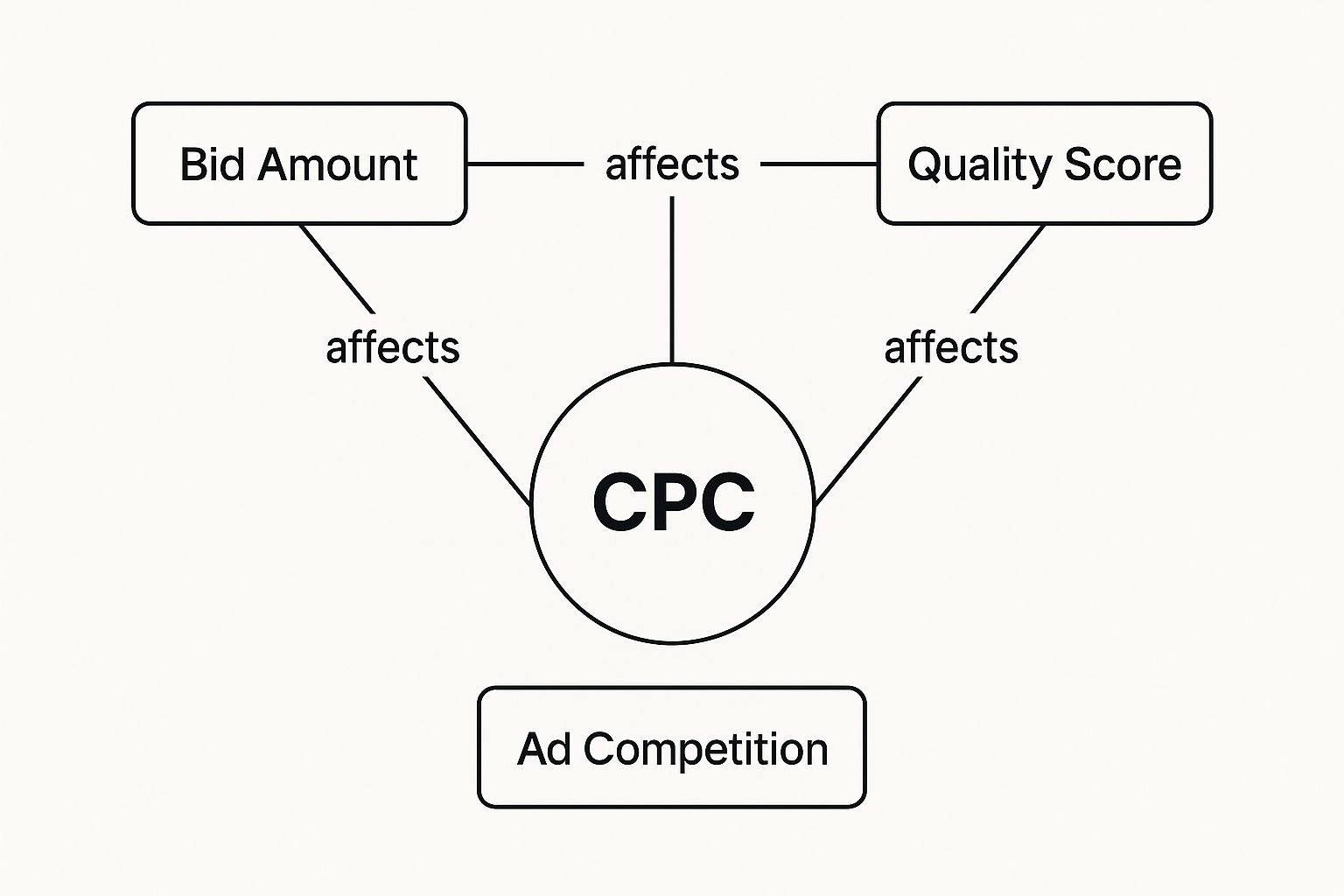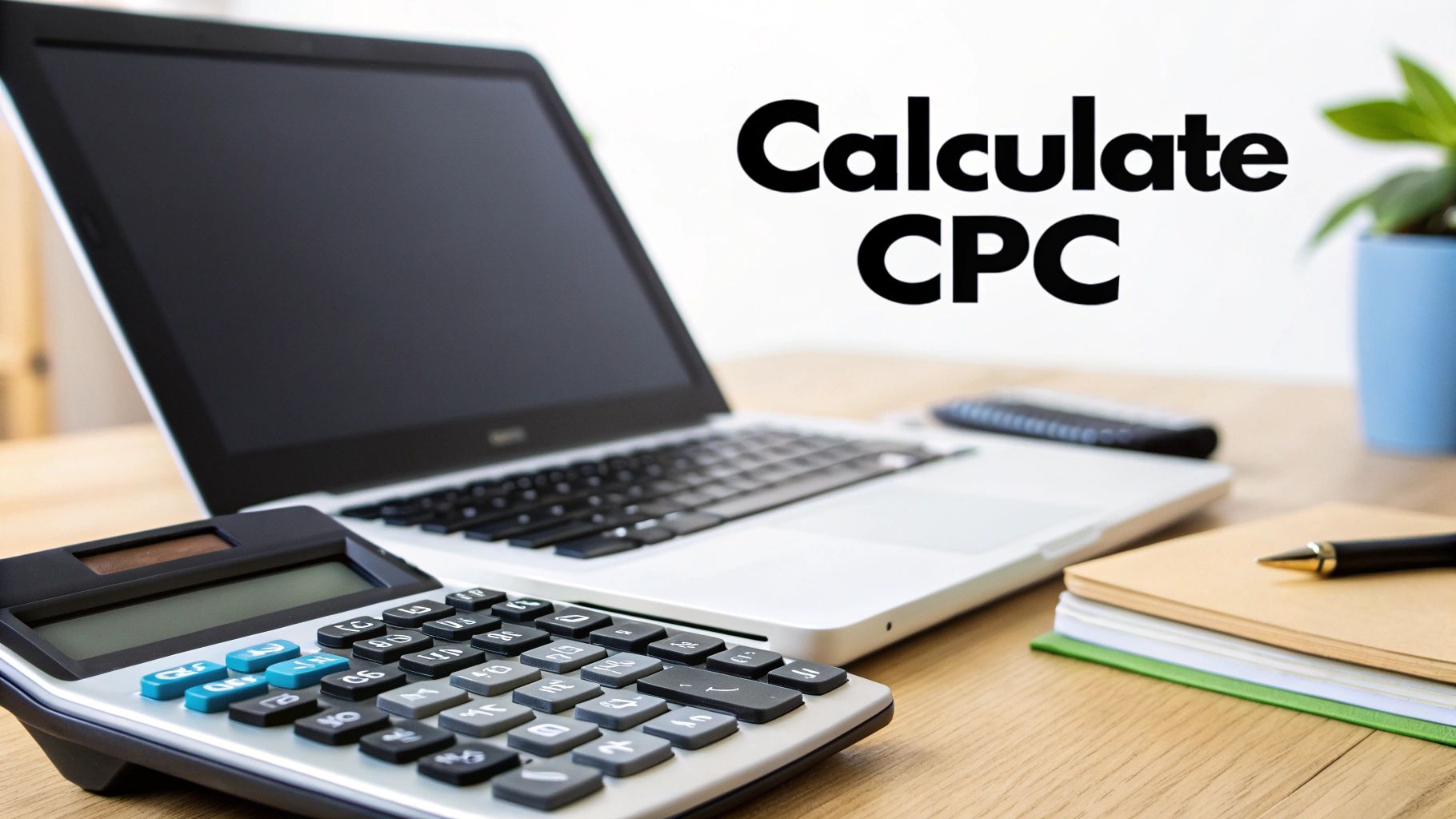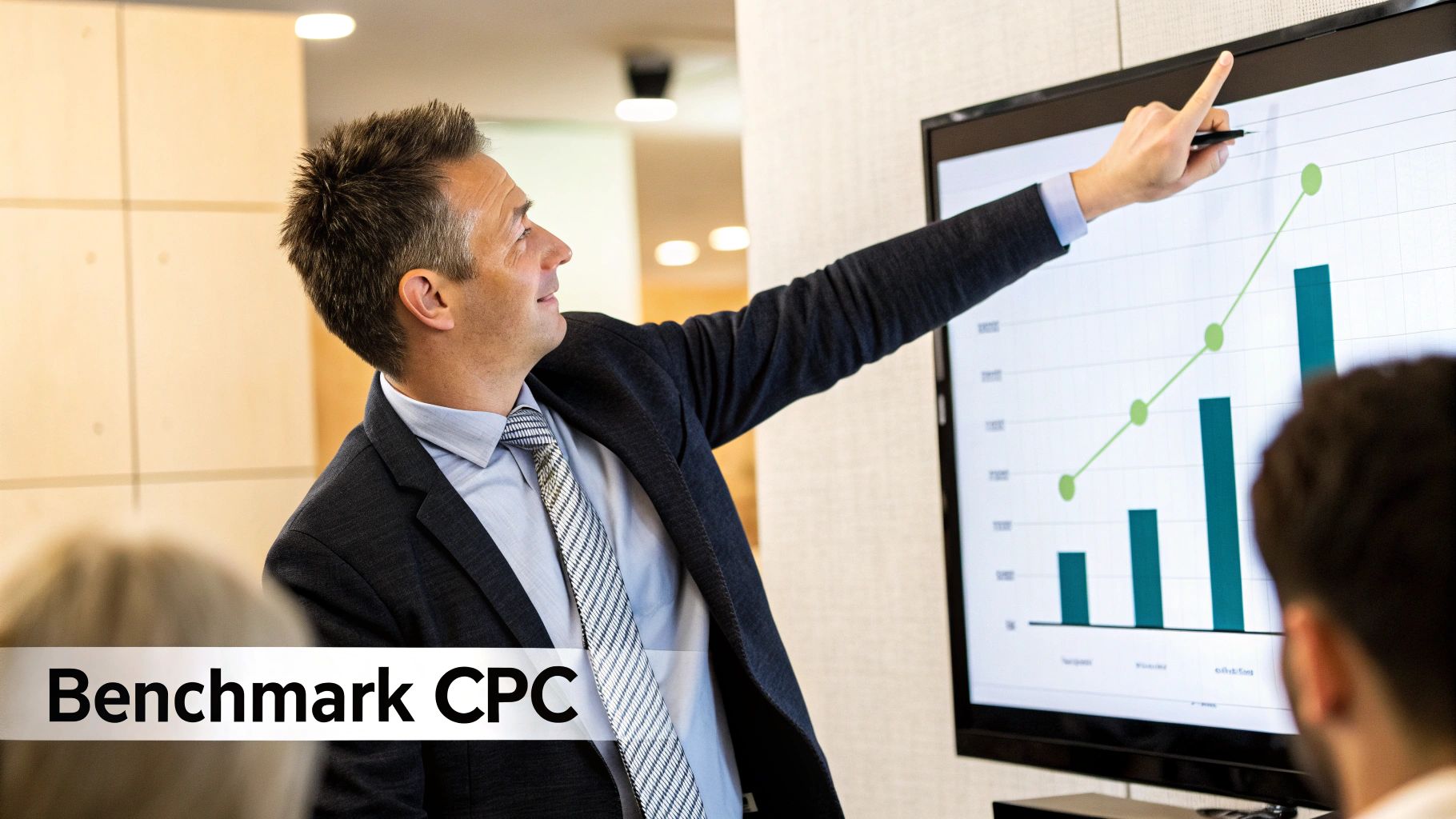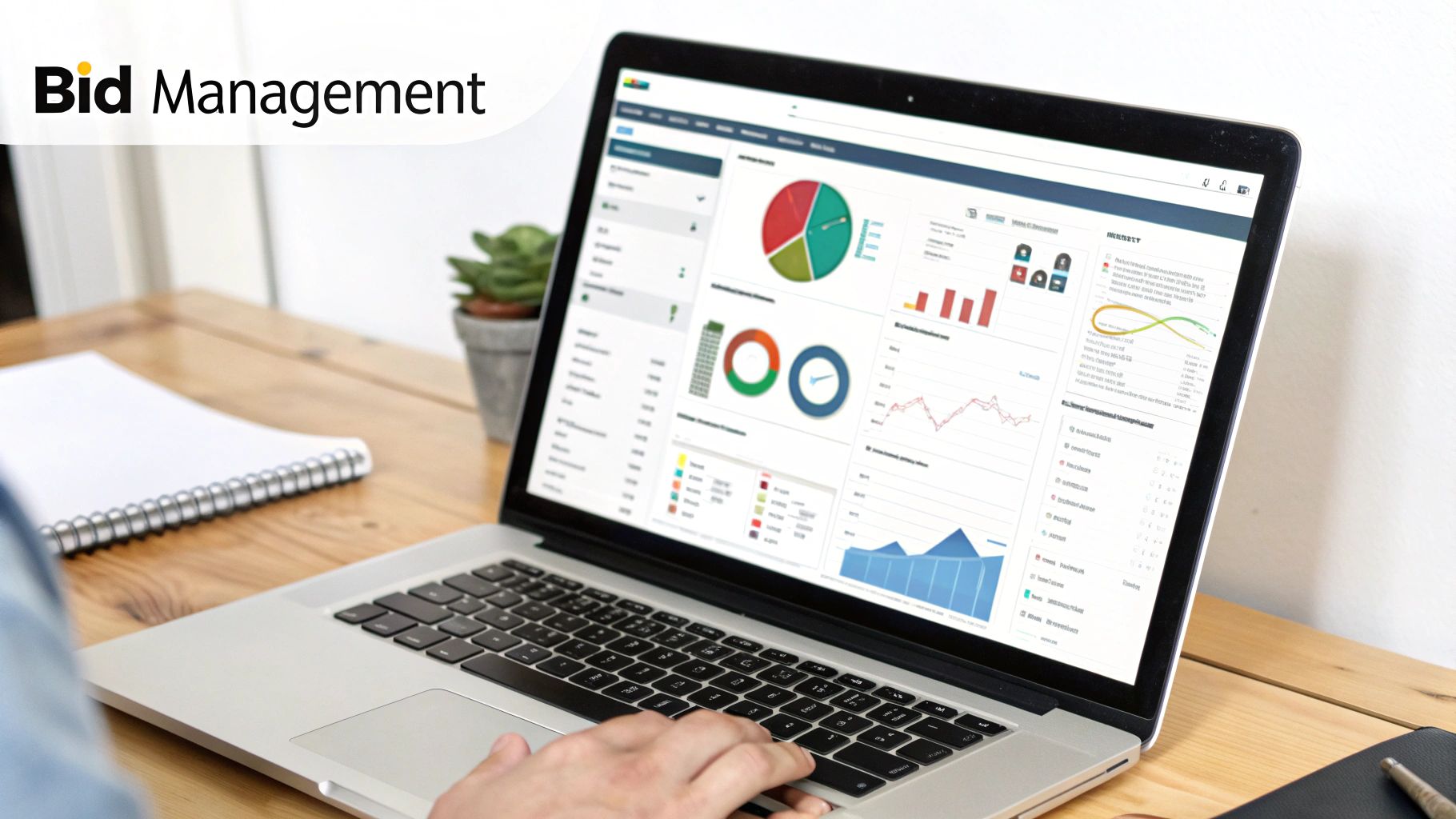Decoding Google Ads Cost Per Click

Right, let’s get straight to the big question everyone asks: what should you actually expect to pay for a click on Google Ads? The short answer is that in the UK, the average Google Ads cost per click is around £2.04 for Search Ads and a much lower £0.48 for Display Ads. But honestly, that’s just a ballpark figure. Your real-world costs will be shaped by your industry, the keywords you’re bidding on, and how well-built your campaigns are.
What Is a Typical Google Ads Cost Per Click?
So, what should you really budget for a click? It’s a bit like asking for the average price of a house in the UK. A national average exists, but the price of a one-bedroom flat in a small town is worlds apart from a five-bedroom house in London.
The same logic applies directly to Google Ads. Bidding on a hugely competitive term like “personal injury solicitor” could easily set you back over £50 per click. On the flip side, a click for a niche query like “handmade scented candles” might cost you less than £1. This huge range is completely normal and is all down to market demand and competition.
Search vs Display Network Costs
To plan your budget effectively, you first need to grasp the difference between Google’s two main advertising arenas: the Search Network and the Display Network.
The Search Network is where people are actively typing in what they need. Because they have a clear intent, these clicks are more expensive but often lead to higher quality enquiries. The Display Network, which places your visual ads on websites and apps across the internet, is much cheaper and is brilliant for building brand awareness rather than driving immediate sales.
As you’d expect, the latest 2024 data from the UK shows a stark contrast. The average cost per click for search ads sat at roughly £2.04, while display ads came in significantly cheaper at around £0.48. These numbers really drive home how the type of campaign you run will directly impact your Google Ads cost per click. You can see a more detailed cost breakdown by checking out the latest industry benchmarks for UK Google Ads costs.
Key Takeaway: Your industry is the biggest factor. High-value sectors like B2B, real estate, and technology often see costs per acquisition (CPA) soaring past £100. Meanwhile, others like the automotive industry might see CPAs closer to a much more modest £25.
UK Google Ads Average Cost Snapshot
To give you a clearer picture, here is a simple breakdown of the core metrics you’ll be working with. Think of this table as a handy reference point when you’re planning your budget and trying to set realistic performance goals for your new campaigns.
| Metric | Average Cost (Search) | Average Cost (Display) |
|---|---|---|
| Cost Per Click (CPC) | ~£2.04 | ~£0.48 |
| Common CPA Range | £30 – £120+ | £20 – £80+ |
These averages are a great starting point for any UK advertiser.
Ultimately, your goal is to find that sweet spot between what you’re spending and the return you’re getting. For a much deeper dive into getting your spending under control, have a read of our guide on understanding CPC and maximising your Google Ads budget. Arming yourself with this knowledge is the very first step toward smart, effective financial planning for your ad campaigns.
How Google Actually Calculates Your Ad Cost
Lots of advertisers fall into the trap of thinking that winning on Google Ads is just a case of having the deepest pockets. While your bid amount is definitely important, it’s only one piece of a much more interesting puzzle. The real decider in the Google ad auction isn’t just who flashes the most cash; it’s who provides the most value.
Think of it like applying for a top job. Your requested salary (your bid) is a big factor, sure, but so is the quality of your CV and how you come across in the interview. A candidate with a brilliant track record and a stellar interview might land the role even if they ask for less money than a less impressive applicant. Google’s system works in a very similar way, rewarding quality over raw financial muscle.
This is where the concept of Ad Rank comes into play. Your Ad Rank determines your ad’s position on the results page, and it’s calculated using two core components: your maximum bid and your Quality Score. A higher Ad Rank means a better position, and often for a lower price.
The Power of Quality Score
Your Quality Score is Google’s rating of the overall quality and relevance of your ads and landing pages. Scored from 1 to 10, it’s Google’s way of measuring how good of an experience you’re giving the searcher. A high Quality Score is a massive green flag to Google that your ad is a fantastic match for what someone is looking for.
This score boils down to three critical elements:
- Expected Click-Through Rate (CTR): How likely is it that someone will actually click your ad when it’s shown? Google looks at your historical CTR to make an educated guess.
- Ad Relevance: Does your ad copy directly relate to what the user searched for? A tightly focused ad that speaks to the searcher’s needs will always score higher.
- Landing Page Experience: Once someone clicks your ad, does your landing page deliver on its promise? A relevant, easy-to-use, and fast-loading page is absolutely essential.
This image shows how your bid, Quality Score, and the competition all feed into what you ultimately pay for a click on Google Ads.
As you can see, these factors are all linked. A strong Quality Score can easily make up for a lower bid, giving you a serious competitive edge.
So, what’s the actual formula for what you pay? It’s this:
(Ad Rank of the advertiser below you / Your Quality Score) + £0.01.
The Big Insight: This formula is proof that you can pay less than your competitor and still rank higher than them if your Quality Score is better. Google actively rewards advertisers who create a more relevant experience for users, making it possible for smaller businesses to compete effectively with the big spenders.
Google Ads Cost Per Click: The Key Factors Driving Your CPC Up or Down
It’s not just the ad auction that dictates your spend. Several powerful forces are constantly working behind the scenes, either pushing your Google Ads cost per click up or pulling it down. Getting your head around these factors is the key to understanding why a click for ‘divorce solicitor’ costs a small fortune while one for ‘knitting patterns’ is a relative bargain.
The most powerful force by far is competition. When dozens of businesses are all bidding on the same keywords, the auction gets crowded and expensive. In high-value industries like legal services or finance, where a single new client can be worth thousands of pounds, advertisers are more than willing to pay a premium for each click. That, in turn, drives up the cost for everyone else in the ring.
Keyword Intent and Value
Not all keywords are created equal. The intent behind a user’s search query has a massive impact on its cost, and it’s a concept every advertiser needs to grasp. Generally, we can group keywords into two main camps based on what the user is trying to do:
- Commercial Keywords: These show a strong desire to buy something. Think “buy leather sofa online” or “emergency plumber near me”. These searches are incredibly valuable because the user is on the verge of making a purchase, which naturally leads to higher CPCs.
- Informational Keywords: These are all about research. Queries like “how to clean a leather sofa” or “what causes a leaky tap” are typically much cheaper to bid on. Why? Because the user isn’t ready to spend money just yet.
A smart strategy often involves targeting a mix of both, but you have to expect to pay significantly more for clicks that signal immediate commercial intent. This distinction is crucial for managing your budget and making sense of any fluctuations in your ad spend.
Targeting That Refines Your Costs
The settings you dial in for your campaign also play a vital role in what you end up paying. These targeting options let you get much more specific about who sees your ads, which directly influences your costs.
For example, fresh data from early 2025 shows that while the average Google Ads CPC for campaigns including the UK is around £1.30, this figure can swing wildly based on your settings. That same data, which covers over 44,000 campaigns, also reveals an average cost per conversion of about £25.50. It really hammers home how essential precise targeting is for achieving a good return. You can explore more details in these extensive Google Ads cost benchmarks.
A Practical Example: Imagine a London-based restaurant advertising during the evening rush hour on mobile phones. They will almost certainly see higher CPCs than a national online retailer advertising at 3 AM. The combination of a prime location (geotargeting), a peak time (ad scheduling), and a high-intent device creates a much more competitive—and therefore more expensive—auction environment.
Google Ads Cost Per Click: How Market Trends and Events Impact Your Ad Spend
Your Google Ads costs don’t exist in a bubble; they’re constantly being nudged and shaped by the world around us. Real-world events, economic wobbles, and even shifts in public mood can send ripples through the digital advertising auction, directly impacting how much competition you face and what you end up paying.
Think of the ad auction a bit like the stock market. When businesses feel confident and optimistic, they invest more heavily in ads, which naturally drives up prices. But during times of uncertainty, many advertisers get nervous and pull back their spending. This can create some surprising opportunities for those who decide to hold their nerve.
Getting your head around this dynamic is key. It helps you move from panicking when costs suddenly spike to thinking strategically and proactively. A sudden jump in your Google Ads cost per click might have nothing to do with your account at all—it could just be a temporary reaction from the wider market.
Lessons from Recent History
The global pandemic gave us all a masterclass in how external events can completely upend ad spending. Looking back at the data from that time reveals a clear and fascinating trend. In 2019, before all the disruption, the average search CPC was sitting around $2.69.
Then, as the pandemic took hold in 2020, widespread economic uncertainty prompted many advertisers to slash their budgets. With less competition in the auction, the average search CPC actually dropped to $2.41. By 2021, as confidence started to creep back into the market, costs bounced right back to where they were before. You can dive deeper into this data with a full analysis of historical CPC fluctuations on Business of Apps.
Key Insight: For savvy UK advertisers, that temporary dip in costs during 2020 was a golden opportunity. While competitors retreated, those who kept their ads running—or even increased their spend—could snap up customers at a lower price and grab valuable market share.
This just goes to show that market volatility isn’t always a threat. If you understand the forces at play, it can be a massive opportunity. Recognising these patterns helps you prepare for predictable seasonal spikes, like Black Friday, and also allows you to pounce when you see your competitors getting hesitant.
Google Ads Cost Per Click: Actionable Strategies to Lower Your CPC Today
Ready to stop overpaying for clicks? The single most powerful lever you can pull to lower your Google Ads cost per click is to improve your Quality Score. It’s simple, really. Google actively rewards advertisers who deliver a superb user experience, and a higher Quality Score directly translates into lower costs and better ad positions.
Think of it like this: for every point your Quality Score goes up, you can see a real drop in your CPC. It’s a direct relationship. Improving your score from a miserable 4 to a solid 8 can literally cut your costs in half. This section is your playbook for making that happen.
The Foundation: Your Quality Score
It all starts with relevance. To give your score a boost, you need to create a seamless journey for the user. That means the keyword they search for, the ad they see, and the landing page they visit all need to be perfectly aligned.
The three pillars of a great Quality Score are:
- Ad Relevance: Your ad copy must speak directly to what the person is searching for. If someone types in “emergency plumber in Manchester,” your ad headline better reflect that exact need and location.
- Expected Click-Through Rate (CTR): You need compelling, benefit-driven ad copy that grabs attention and gets clicked. Google rewards ads that have a history of earning those clicks.
- Landing Page Experience: The page users land on after clicking your ad has to deliver on the promise. It should be relevant, easy to navigate, and load in a flash.
Nailing these three components is the most effective way to drive down your ad spend. Period.
Building Hyper-Focused Ad Groups (Google Ads Cost Per Click)
One of the most common mistakes we see is cramming dozens of vaguely related keywords into one ad group. This forces you to write generic ads that don’t really speak to any specific search, which kills both your relevance and your CTR. The fix? Build small, tightly-themed ad groups.
For example, a shoe shop shouldn’t have one massive ad group for “men’s trainers.” Instead, they should create separate ad groups for “men’s running trainers,” “men’s white trainers,” and “men’s leather trainers.” This approach allows you to write specific, highly relevant ads for each type of search, which will inevitably boost your Quality Score and lower your CPC.
By structuring your account this way, you ensure your ad message is always a perfect match for the user’s intent. This precision is fundamental to maximising your ROI with Google advertising strategies and achieving real campaign efficiency.
Advanced Keyword Tactics for Cost Control
Beyond just structure, your keyword strategy itself offers huge opportunities for savings. You need to be proactive in what you target and absolutely ruthless in what you exclude.
- Embrace Long-Tail Keywords: Stop bidding on expensive, broad terms like “solicitors.” Instead, target longer, more specific phrases like “family law solicitors for divorce proceedings.” These long-tail keywords have far less competition—and therefore a lower CPC—but often signal much higher purchase intent.
- Build a Robust Negative Keyword List: This is completely non-negotiable for cost control. A negative keyword list stops your ads from showing up for irrelevant searches that waste your money. If you sell premium leather shoes, you must add negative keywords like “cheap,” “repair,” and “second-hand” to avoid paying for clicks that will never convert.
A crucial element that’s often overlooked when optimising Google Ads campaigns is the quality of your landing page. Understanding and implementing effective landing page design best practices can dramatically improve user experience, which in turn gives your Quality Score a direct boost. Putting these tactics into practice will turn your account into a lean, efficient machine.
Beyond CPC The Real Goal Is Profitability
It’s easy to get tunnel vision and obsess over your Google Ads cost per click. While it feels like you’re being productive, you can quickly lose sight of what actually matters. The end goal isn’t just to get the cheapest clicks possible; it’s to land the most profitable ones. A low CPC is a false economy if those clicks never convert into paying customers.
Think about it like buying tools for a job. Would you rather pay £0.50 for a flimsy screwdriver that snaps on the first turn, or invest £5 in a quality one that helps you build something worth £100? The choice is a no-brainer. Sometimes, a higher CPC is a small price to pay for high-quality traffic that actually wants what you’re selling.
This is exactly why chasing a rock-bottom CPC can be a trap. You might end up targeting low-value keywords that attract window shoppers instead of serious buyers, effectively burning through your budget on clicks with zero commercial intent.
From Cost Saving to Value Creation
To make this crucial shift in mindset, there’s one tool you absolutely need in your arsenal: conversion tracking. Without it, you’re just flying blind. Conversion tracking is what lifts the curtain, showing you exactly which keywords, ads, and campaigns are driving real-world actions like sales, form submissions, or phone calls.
The Real Win: Successful advertising isn’t about saving money—it’s about investing it wisely to achieve measurable business growth. A higher CPC that generates a strong Return on Investment (ROI) will always beat a cheap click that delivers nothing.
This data-first approach lets you make smarter, more profitable decisions. You can confidently put more budget behind what’s working and slash spending on what isn’t. For a deeper dive into this principle, understanding the strategies for maximising Google Ads ROI for UK brands is a vital next step.
While getting your paid ads right is essential, a truly solid digital strategy often mixes in organic efforts too. Many small businesses find that exploring affordable SEO services for small businesses perfectly complements their paid campaigns, driving sustainable, long-term growth.
Frequently Asked Questions
When you’re deep in the data, managing your Google Ads cost per click can bring up some tricky questions. Let’s tackle the most common ones with clear, direct answers to help you make smarter decisions.
Is a High CPC Always a Bad Thing?
Not at all. While it feels completely counterintuitive, a high CPC isn’t automatically a red flag. In many cases, it’s actually a positive signal that you’re bidding on a high-value, high-intent keyword that attracts serious buyers.
Think of it this way: a click for a commercial keyword like “emergency plumber” might be expensive, but that single click could lead to a job worth hundreds of pounds. Paying a premium for a click that has a strong chance of converting into a profitable customer is just smart business. The real danger is a low CPC on keywords that attract window shoppers with no intention of ever buying from you.
A high CPC combined with a strong conversion rate and a healthy Return on Investment (ROI) is the sign of a successful campaign, not a failing one.
What Is a Realistic Starting Budget?
For a small business just dipping its toes in the water, a good entry point is often between £500 to £2,500 per month. This range provides enough budget to gather meaningful performance data without being an overwhelming initial investment.
But a more precise answer really depends on your industry’s average CPC. If you’re in a competitive market where clicks cost £5 each, a £10 daily budget will only get you two clicks—that’s not nearly enough data to optimise anything. As a rule of thumb, aim for a budget that allows for at least 10-20 clicks per day to get the insights you truly need.
How Long Does It Take to Lower CPC?
Patience is crucial here. After you’ve made changes to improve your Quality Score—like refining ad copy or optimising landing pages—it typically takes 2 to 4 weeks to see a noticeable drop in your CPC. Google’s system needs time to gather the new performance data and adjust your scores accordingly.
This isn’t an overnight fix. Consistent, hands-on management and optimisation are the key to gradually driving down your costs over time. To stay on the right track, it’s a fantastic idea to learn how to audit your Google Ads account like a pro to spot opportunities for improvement and measure your progress effectively.
Ready to take the guesswork out of your ad spend? The team at PPC Geeks offers a free, in-depth PPC audit to show you exactly where you can lower costs and boost your ROI. Get your free audit today at https://ppcgeeks.co.uk.
Author
Search Blog
Free PPC Audit
Subscribe to our Newsletter
The Voices of Our Success: Your Words, Our Pride
Don't just take our word for it. With over 100+ five-star reviews, we let our work-and our satisfied clients-speak for us.
"We have been working with PPC Geeks for around 6 months and have found Mark and the team to be very impressive. Having worked with a few companies in this and similar sectors, I rate PPC Geeks as the strongest I have come across. They have taken time to understand our business, our market and competitors and supported us to devise a strategy to generate business. I value the expertise Mark and his team provide and trust them to make the best recommendations for the long-term."
~ Just Go, Alasdair Anderson




